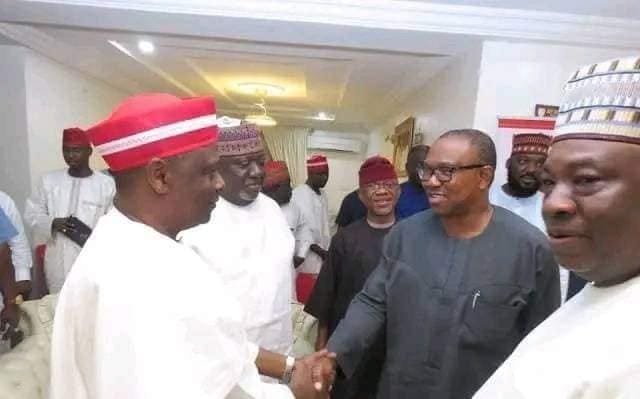Politics
APC Predicts Failure of Obi-Kwankwaso Alliance for 2027 Elections

The APC outlines reasons why the potential alliance between Peter Obi and Rabiu Kwankwaso in the 2027 presidential race will not succeed, pointing to conflicting interests.
The All Progressives Congress (APC) has conveyed confidence that a potential alliance between Rabiu Kwankwaso of the New Nigeria People’s Party (NNPP) and Peter Obi of the Labour Party will not threaten their prospects in the 2027 presidential election.
In an interview with The PUNCH on Monday, Bala Ibrahim, the National Publicity Director of the APC, expressed skepticism about the possibility of the alliance succeeding.
Ibrahim mentioned the unsuccessful effort to bring together both candidates before the 2023 election, attributing its failure to a lack of trust between Obi and Kwankwaso.
He explained that both politicians aspire to become president, and neither is expected to defer to the other. Ibrahim stated, “Trust issues will persist between Obi and Kwankwaso, as they are both unwilling to give up their presidential ambitions.”
Kwankwaso recently suggested a potential collaboration with Peter Obi, indicating his readiness to be Obi’s vice-presidential candidate in 2027 under specific undisclosed conditions. Umar Farouk, the National Secretary of the Labour Party, responded positively to this proposal but emphasized that such a partnership could succeed only if Kwankwaso approached it with humility.
Nevertheless, the APC remains confident that the proposed alliance will falter again, just as it did in 2023.
Ibrahim concluded that the factors which hindered the previous collaboration attempt are still present, and the APC remains unconcerned about potentially facing both parties again in 2027.
Ibrahim explained that trust is the crucial element in this situation and will ultimately undermine their agreement. He noted that similar experiments have been conducted multiple times, with consistent results unless there was a change to the influencing factor. Repeating an experiment under identical conditions while expecting different outcomes without altering any factors is simply self-deception, following scientific principles.
Kwankwaso and Peter Obi have made multiple attempts to form an alliance in the past, but their partnerships have been short-lived. This is largely due to their incompatible political views, which make it difficult for them to collaborate effectively. Both leaders are driven by a strong desire to lead the country and are reluctant to concede leadership ambitions because of underlying competitive tensions between them.
As long as that complex remains, which is unlikely to diminish anytime soon, there won’t be any reason for the APC to lose sleep. What they’re proposing now is mere rhetoric in response to the progress and changes happening within the political landscape due to APC initiatives. They are aware that by 2027, an APC victory is inevitable. Their actions amount to noise intended simply for survival—echoes from a party headed towards its downfall. Consequently, there’s nothing here for the APC to worry about; it’s a merger that’s destined not to happen.
The National Deputy Publicity Secretary of the Peoples Democratic Party, Abdullahi Ibrahim, characterized the proposed Obi-Kwankwaso alliance as a positive development.
Ibrahim informed The PUNCH that the PDP is open to discussions about forming an alliance or merger aimed at freeing Nigerians from the ongoing difficulties and control of the APC-led government.
He stated, “This is a positive development. We initiated the conversation at the invitation of the PDP when key opposition leaders convened to assess the nation’s situation. Moving forward, we hope that all opposition parties will unite and pursue a shared goal, whether it involves Peter Obi’s Labour Party, Kwankwaso’s NNPP, or an effort led by the PDP.”
We remain the major opposition party, having previously held power at the central level for 16 years. Currently, we have governance in 13 states plus the FCT under Nyesom Wike’s administration, totaling 14 governors. As of now, Wike has not announced any plans to leave the PDP. Given these factors, we continue to be the leading opposition force in this country and are actively shaping its direction.
As previously mentioned, it is admirable even though it’s not our political party. It’s crucial for the country’s welfare that those with the ability work to lift people out of widespread despair and hopelessness. Clearly, Nigerians are eager to see a change in leadership due to dissatisfaction with APC’s insensitive governance style.
